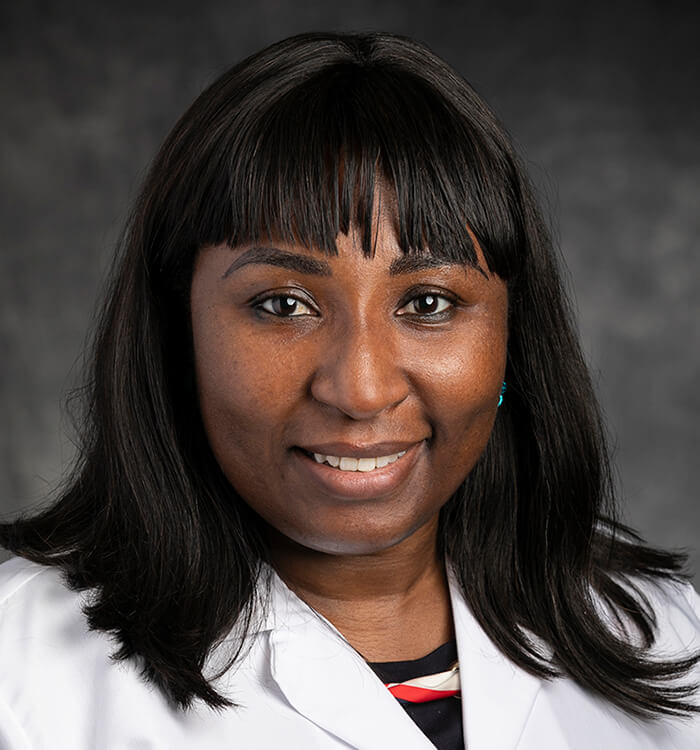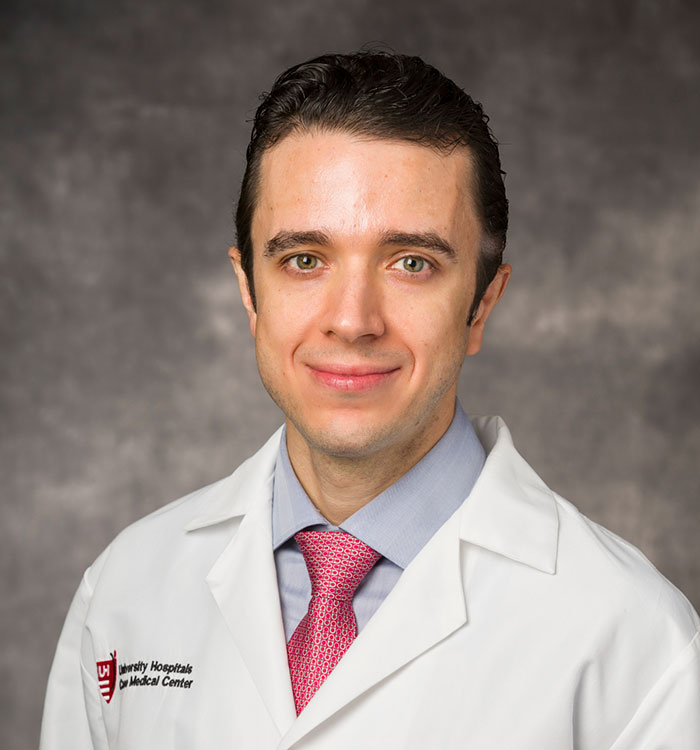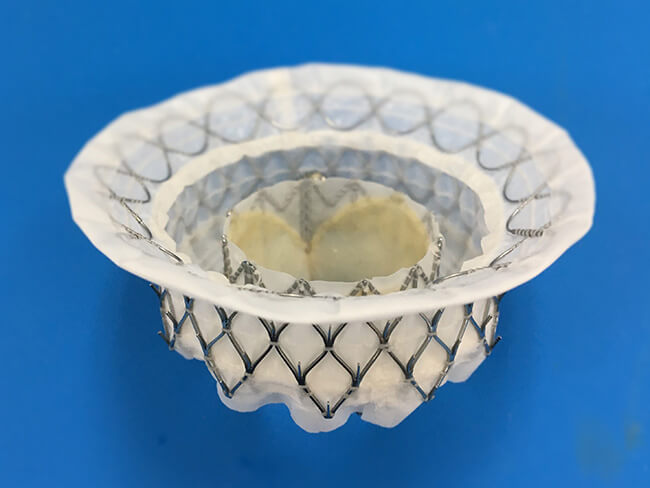University Hospitals Harrington Heart & Vascular Institute in the Top 20 Nationally for MitraClip Volumes
February 19, 2023
Quality remains high in fast-growing program
Innovations in Cardiovascular Medicine & Surgery | Winter 2023
The mitral valve program within University Hospitals Heart & Vascular Institute continues to grow and evolve, offering patients with mitral regurgitation the highest-quality care, the latest minimally invasive treatment options and access to important clinical trials. In fact, the program is one of the fastest-growing programs in the country. It recently hit the top 20 among 451 programs nationally in patient volumes for the past six months.
 Arene Ukaigwe, MD
Arene Ukaigwe, MD Guilherme Attizzani, MD
Guilherme Attizzani, MD“We were marked as one of the fastest-growing programs about a year ago, but to actually rank number 20 of all programs in the country is an achievement that we're all proud of,” says Anene Ukaigwe, MD, interventional cardiologist and member of the Valve and Structural Heart Disease Center within UH Harrington Heart & Vascular Institute.
Importantly, quality metrics for MitraClip procedures in UH Harrington Heart & Vascular Institute remained pristine and stable during the period under review.
“It's not just that there was an increase in our numbers, but also that there was no compromise in quality,” Dr. Ukaigwe says. “Our quality compared very favorably with similar centers across the nation.”
Dr. Ukaigwe says the stepped-up case load of MitraClip procedures likely helped create high-quality outcomes for patients.
“The fact that volumes are increasing is going to drive up quality, for practically every procedure,” she says. “There's a volume-quality relationship. The more you do, the more your expertise increases, and not just your expertise but that of the members of your team in diagnosing, evaluating and appropriately triaging these patients. I believe the multidisciplinary team involvement has been a tremendous contributor to our growth and success.”
Teamwork Drives Quality Outcomes
Dr. Ukaigwe also attributes increased MitraClip patient volumes to increased communication with referring physicians throughout the University Hospitals Health System and seamless coordination among all experts on the UH Harrington Heart & Vascular Institute mitral valve team.
 MitraClip device.
MitraClip device.“We have considerable expertise available for mitral valve repair,” she says. “We have a strong multidisciplinary team that's inclusive of our advanced heart failure, advanced cardiac imaging and cardiac surgery colleagues. We all evaluate these patients together and share expertise. In addition, our team nurse navigators and advanced practice providers work tirelessly to promptly coordinate and navigate patients through their treatment journey. Our cardiac cath lab team has worked around the staffing shortages caused by COVID and found a way to make sure that we effectively and efficiently offer this therapy to our patients. Our cardiology colleagues, who are vital to performing this procedure, have also been immensely helpful. Everyone’s efforts are completely valued and integral in making this happen.”
Comprehensive Mitral Valve Options
The mitral valve team at UH Harrington Heart & Vascular Institute is next turning its focus to implementing the Pascal mitral valve repair device – approved in January by the U.S. Food and Drug Administration -- for the University Hospitals health system.
“As part of a growing mitral valve program, we're working to offer all the transcatheter edge-to-edge repair devices, one of which is the Pascal device made by Edwards,” Dr. Ukaigwe says. “We were lucky to be part of a limited market release evaluation of that product, shown to effectively treat mitral regurgitation.”
In addition to MitraClip and Pascal, other minimally invasive mitral valve therapies continue to be options for University Hospitals patients, Dr. Ukaigwe says. These include mitral valve-in-mitral annular calcification (MAC) for patients with severe mitral regurgitation and/or stenosis associated with severe mitral valve calcification, mitral valve-in-valve, which implants transcatheter valves inside failed surgical mitral valves for high surgical risk patients, and mitral valve-in-ring for high surgical risk patients with severe mitral regurgitation and/or stenosis who have had prior surgical mitral valve repair.
“We were pioneers in the U.S. with the mitral valve-in-ring procedures. UH Harrington Heart & Vascular Institute cardiac surgeon, Dr. Alan Markowitz, and I started this program years ago and published the initial very successful case series,” says Guilherme Attizzani, MD, Medical Director of the Valve and Structural Heart Disease Center within UH Harrington Heart & Vascular Institute and the Alexander and Marianna McAfee Chair in Innovative Cardiac Interventions.
Important Participation in Clinical Trials
However, for some patients, none of these approaches are quite right for their particular experience with mitral regurgitation. For these patients, UH Harrington Heart & Vascular Institute offers two key clinical trials of mitral valve replacement technologies.
Marc Pelletier, MD, Chief of Cardiac Surgery for UH Harrington Heart & Vascular Institute, and Dr. Attizzani are leading the MitraClip REPAIR MR trial at UH Cleveland Medical Center. Its goal is to compare the clinical outcomes of the MitraClip device versus surgical repair in patients with severe primary mitral regurgitation who are at moderate surgical risk and whose mitral valve has been determined by a cardiac surgeon to be suitable for surgical correction. The study team will look at mitral regurgitation severity 30 days after treatment, as well as two years later, while also assessing other clinical endpoints.
“This trial is very important, as the only randomized study in the field was small and does not reflect current clinical practice,” Dr. Attizzani says. “REPAIR MR, on the other hand, reflects contemporary practice with newer generations of MitraClip, which can help deliver improved and more sustainable results combined with operators’ increased expertise. It will deliver a fair comparison between MitraClip and surgical repair in this setting.”
A second mitral valve trial at UH Cleveland Medical Center, led by Dr. Attizzani and Cristian Baeza, MD, Surgical Director of the Valve and Structural Heart Disease Center in UH Harrington Heart & Vascular Institute, is the Apollo trial, which is testing the Intrepid device. Intrepid is an investigational transcatheter mitral valve replacement procedure that delivers a replacement mitral valve through a catheter inserted through the groin into the malfunctioning valve within the heart. Patients are randomized to either Intrepid or conventional mitral valve replacement surgery. Additionally, study patients deemed too high risk for surgery may be directly approved for Intrepid.
UH Cleveland Medical Center is the only site in Northeast Ohio participating in the Apollo trial of Intrepid.
“The Intrepid valve is a revolutionary technology which has shown promising initial results,” Dr. Attizzani says. “It is the first clinical trial of a dedicated transcatheter mitral valve ever conducted in the U.S. This device enables treatment of patients in whom other transcatheter therapies such as MitraClip would not be feasible.”
For Dr. Attizzani, it’s all part of providing comprehensive care to patients with mitral valve disorders. “It’s the full spectrum of mitral valve interventions, a combined effort of interventional cardiology and cardiac surgery,” he says.
Contributing Experts:
Anene Ukaigwe, MD
Interventional Cardiologist
UH Harrington Heart & Vascular Institute
Guilherme Attizzani, MD
Co-Director, Valve and Structural Heart Disease Center
UH Harrington Heart & Vascular Institute
Alexander and Marianna McAfee Chair in Innovative Cardiac Interventions
Professor, Case Western Reserve University School of Medicine


